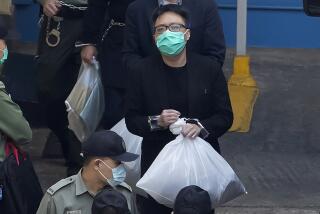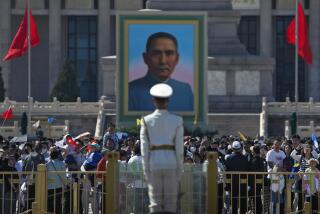Longtime Prisoner Freed in China : Release: Wei Jingsheng was jailed in 1979 for his famous 1978 wallposter calling for democracy.
- Share via
BEIJING — In a move timed to enhance its candidacy to host the 2000 Olympic Games, the Chinese government today announced the release of Wei Jingsheng, China’s most famous and longest-serving political prisoner.
Wei, 43, was jailed in 1979 for his leadership in the “Democracy Wall” movement.
The former electrician ignited the 1978-1981 movement for political reforms in China with a Dec. 5, 1978, wallposter calling for democracy as a “fifth modernization.” The appeal was a direct slap at leader Deng Xiaoping’s program of four modernizations to improve China. Eleven years later, Wei’s call for a “fifth modernization” again became a rallying cry for Chinese students and other democracy protesters in Tian An Men Square.
Chinese Justice Ministry spokesman Chen Ming said Wei’s release after serving 14 1/2 years of a 15-year sentence came because he had “obeyed prison regulations.”
However, the release came 10 days before the International Olympic Committee members meet in Monte Carlo to consider China’s candidacy to host the 2000 Olympic Games in Beijing.
Human rights abuses and, specifically, the prolonged imprisonment of Wei, are considered the principle blocks to Beijing securing the spot of Olympic host against rivals such as Sydney, Australia; Manchester, England; Berlin, Germany, and Istanbul, Turkey. Sydney and Beijing are considered the favorites among the 90 voting members of the Olympic committee.
“It is wonderful that Wei has been released,” said Robin Munro, Hong Kong director of the Asia Watch human rights organization, “but in this case it is clearly a rather cheap propaganda maneuver by the Chinese government. He was due to be released in March anyway. The Chinese government does not deserve any human rights credit points for this.”
For more than 10 years Chinese authorities kept Wei in a forced “labor reform camp” in remote western Qinghai province. During this period, Munro said, Wei lost all his teeth and may have suffered a mental breakdown.
After a severe earthquake destroyed the labor camp, Wei was transferred to the Nanpu New Life Salt Farm in the coastal salt marshes east of Beijing.
Although most Chinese prisoners are routinely released on parole after serving three-quarters of their terms, Chinese authorities said Wei remained “unrepentant” and therefore was ineligible for early release. Even in the last months of his captivity, according to Asia Watch, he was held in a solitary 6-foot-by-8-foot cell with a small yard.
“Our information is that he is in fairly good health and that he is mentally alert,” Munro said. “I imagine he will still be quite feisty.”
Justice Ministry spokesman Chen said Wei was released on parole in a decision by the Hebei Province Intermediate People’s Court. Chen said the prisoner was provided a car and driver for his return to Beijing.
Wei was the last of the Democracy Wall protesters to be released from prison. “Of all the flood of words that appeared in this period,” wrote Yale University historian Jonathan D. Spence, “none had more impact than those of a young man called Wei Jingsheng.”
In his famous wallposter, Wei wrote that without democracy, the economic reforms proposed by China’s emerging leader, Deng Xiaoping, would have no meaning.
“What is democracy?” he wrote. “It means the right of the people to choose their own representatives who will work according to their will and in their interests. Only this can be called democracy.”
In a related development, the wife of another jailed dissident, Wang Juntao, said Chinese authorities have approved her long-pending request to travel overseas. Hou Xiaotian, 30, said she plans to travel to the United States but will return eventually to China.
“My life, my work are not in the United States--they are in China,” she said.
More to Read
Sign up for Essential California
The most important California stories and recommendations in your inbox every morning.
You may occasionally receive promotional content from the Los Angeles Times.













